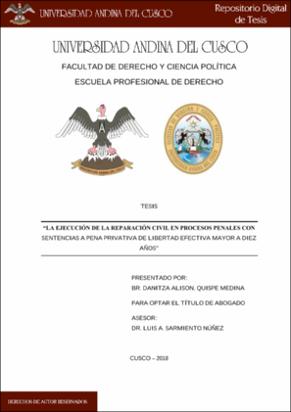| dc.contributor.advisor | Sarmiento Núñez, Luis Alfonso | |
| dc.contributor.author | Quispe Medina, Danitza Alison | |
| dc.date.accessioned | 2019-02-19T16:03:51Z | |
| dc.date.available | 2019-02-19T16:03:51Z | |
| dc.date.issued | 2018-06-19 | |
| dc.identifier.uri | https://hdl.handle.net/20.500.12557/2236 | |
| dc.description.abstract | El presente trabajo de investigación tiene un enfoque cualitativo, que consiste en el
estudio de la gente a partir de lo que dicen y hacen las personas en el escenario social y
cultural, con un diseño de Investigación - Acción, la cual es una forma de búsqueda auto
reflexiva llevada a cabo en situaciones sociales para perfeccionar la lógica y la equidad de
prácticas cotidianas, siendo exploratoria de carácter propositivo, orientada a la
comprobación.
Se tiene que la comisión de un delito, así como la responsabilidad de su autor, genera la
imposición no solo de una pena, sino también el pago de la reparación civil, es ahí donde se
plantea el problema cuando por tratarse de penas privativas de libertad efectivas mayores a
diez años, el estado y las normas no atienden al interés del agraviado por ejecutar el pago de
la reparación civil. Teniendo como objetivo determinar la ejecución de la reparación civil en
procesos penales en los cuales se dictan sentencias con pena privativa de libertad efectiva
mayor a diez años, para ello se recolecto información bibliográfica referente a las categorías
de estudio, penas privativas de libertad efectiva mayor a diez años y la inejecución de la
reparación civil, contando con el apoyo de docentes y libros especializados en sede penal.
El análisis de libros y trabajos de investigación, y el análisis de jurisprudencia nacional han
permitido establecer nuevos enfoques de la problemática de la reparación civil en sede penal.
Los resultados han permitido conocer la realidad de la problemática en cuestión y brindar
los aportes necesarios para establecer cambios sustantivos en la búsqueda de su mejor aplicación y ejecución, siendo que existen problemas específicos como la falta de atención
por el estado en los mecanismos de ejecución efectiva del pago de reparación civil, ordenada
por el juez penal.
Concluyendo que, efectivamente no se ejecuta el pago de la reparación civil por los
sentenciados ya que es el propio sistema jurídico peruano entre ellos nuestra Constitución
Política del Estado, que no permite el cumplimiento del pago de reparación civil a favor de
las víctimas del delito, por considerar que por deuda no hay prisión, resultando ello un
respaldo para los sentenciados. | es_PE |
| dc.description.abstract | The present research work has a qualitative approach, which consists in the study of
people based on what people say and do in the social and cultural scenario, with a Research-
Action design, which is a form of self-reflective search carried out in social situations to
perfect the logic and fairness of everyday practices, being exploratory of a proactive nature,
oriented towards verification.
The commission of an offense as well as the responsibility of its author, generates the
imposition not only of a penalty, but also the payment of civil compensation, this is where
the problem arises when, because it is an effective prison term of more than ten years, the
state and the rules do not attend to the aggrieved party's interest in executing the payment of
the civil compensation. Having as objective to determine the execution of the civil reparation
in criminal processes in which sentences are pronounced with effective deprivation of liberty
for more than ten years, for this, bibliographic information was collected regarding the
categories of study, penalties deprivation of effective freedom for more than ten years and
the non-performance of civil reparation, with the support of teachers and specialized books
in penal headquarters. The analysis of books and research work, and the analysis of national
jurisprudence have allowed to establish new approaches to the problem of civil reparation in
criminal courts.
The results have allowed to know the reality of the problem in question and provide the
necessary contributions to establish substantive changes in the search for its best application and execution, being that there are specific problems such as the lack of attention by the state
in the mechanisms of effective execution of the payment of civil compensation, ordered by
the criminal judge.
Concluding that, in effect, the payment of civil compensation is not executed by those
sentenced since it is the Peruvian legal system itself, including our Political Constitution of
the State, that does not allow the payment of civil compensation in favor of the victims of
the crime, considering that for debt there is no prison, resulting in an endorsement for those
sentenced. | en_US |
| dc.description.uri | Tesis | es_PE |
| dc.format | application/pdf | es_PE |
| dc.language.iso | spa | es_PE |
| dc.publisher | Universidad Andina del Cusco | es_PE |
| dc.rights | info:eu-repo/semantics/restrictedAccess | es_PE |
| dc.source | Universidad Andina del Cusco | es_PE |
| dc.source | Repositorio Institucional - UAC | es_PE |
| dc.subject | Reparación civil | es_PE |
| dc.subject | Delito | es_PE |
| dc.subject | Proceso penal | es_PE |
| dc.subject | Proceso civil | es_PE |
| dc.subject | Proceso agraviado | es_PE |
| dc.subject | Sentenciado | es_PE |
| dc.subject | Estado | es_PE |
| dc.title | La ejecución de la reparación civil en procesos penales con sentencias a pena privativa de libertad efectiva mayor a diez años. | es_PE |
| dc.type | info:eu-repo/semantics/bachelorThesis | es_PE |
| thesis.degree.name | Abogada | es_PE |
| thesis.degree.grantor | Universidad Andina del Cusco. Facultad de Derecho y Ciencia Política | es_PE |
| thesis.degree.level | Titulo Profesional | es_PE |
| thesis.degree.discipline | Derecho | es_PE |

